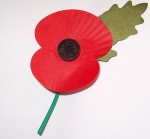Lest we forget….
 Remembrance day – or Poppy Day – has become a day of remembrance for all who have fallen in conflict across the world, but where did it begin, what is its history and why do we use a poppy?
Remembrance day – or Poppy Day – has become a day of remembrance for all who have fallen in conflict across the world, but where did it begin, what is its history and why do we use a poppy?
Poppy day was actually inspired by a poem by John McRae written after some of the bloodiest battles of World War I at Flanders and Picardy:
In Flanders’ Fields
John McCrae, 1915
In Flanders’ fields the poppies blow
Between the crosses, row on row,
That mark our place: and in the sky
The larks, still bravely singing, fly
Scarce heard amid the guns below.
We are the dead. Short days ago
We lived, felt dawn, saw sunset glow,
Loved and were loved, and now we lie
In Flanders’ fields.
Take up our quarrel with the foe;
To you from failing hands we throw
The torch; be yours to hold it high,
If ye break faith with us who die
We shall not sleep, though poppies grow
In Flanders’ Fields.
The poppy was the only plant that grew in the devastation in the fields, and their bright red colour was symbolic of the blood that had been shed. John McCrae, a doctor serving in the Canadian Armed Forces was deeply moved by this and wrote the above poem.
The First World War ended at the 11th hour on the 11th day of the 11th month in 1918. After such a terrible war, many people wanted some way of remembering those who had given their lives. It was the American War Secretary, Moina Michael, who started selling poppies (inspired by John McCrae’s poem) to raise money for ex-servicemen and started an annual tradition that has lasted to the present day.
King George V announced the first Remembrance Day to be held on 11th November 1919, and this event with its 2 minutes of silence was reported in the Manchester Guardian very movingly as follows:
The first stroke of eleven produced a magical effect. The tram cars glided into stillness, motors ceased to cough and fume, and stopped dead, and the mighty-limbed dray horses hunched back upon their loads and stopped also, seeming to do it of their own volition. Someone took off his hat, and with a nervous hesitancy the rest of the men bowed their heads also. Here and there an old soldier could be detected slipping unconsciously into the posture of ‘attention’. An elderly woman, not far away, wiped her eyes, and the man beside her looked white and stern. Everyone stood very still … The hush deepened. It had spread over the whole city and become so pronounced as to impress one with a sense of audibility. It was a silence which was almost pain … And the spirit of memory brooded over it all
 The first official Poppy Day was held in Britain on 11th November 1921. From 1922 the poppies were made by disabled ex-service members of the Royal British Legion.
The first official Poppy Day was held in Britain on 11th November 1921. From 1922 the poppies were made by disabled ex-service members of the Royal British Legion.
Here in Britain, the official Remembrance Day is always held on the second Sunday of November, where a ceremony is held with members of the Royal Family and members of the armed forces at the cenotaph at Whitehall, and all over Britain – but a 2 minutes silence is also held on the day of 11th November itself. Up until 2008 veterans of World War I attended the Sunday ceremony, but the last of these died in 2009.
Tomorrow, and Sunday, I will be taking part in the 2 minute silence as usual, and though my own immediate family have been lucky enough to remain relatively unscathed by both world wars, I know that they lost close friends in those conflicts and I shall remember them, and the enormous sacrifice that was made for our freedom.

